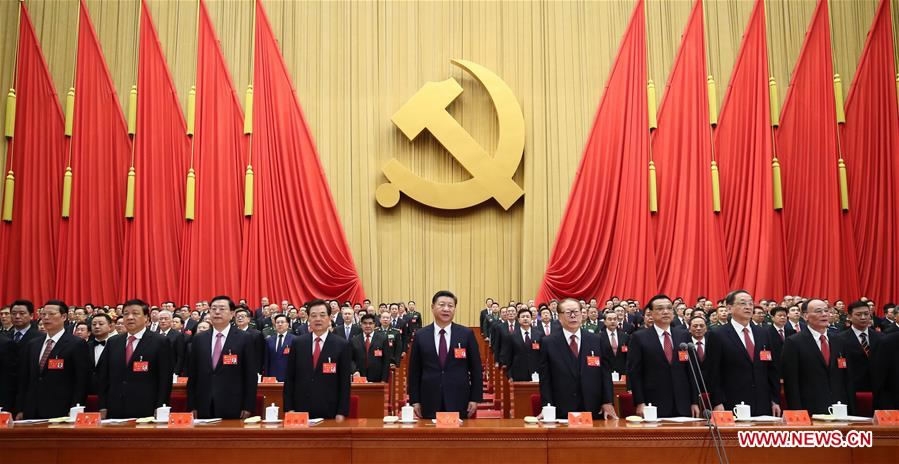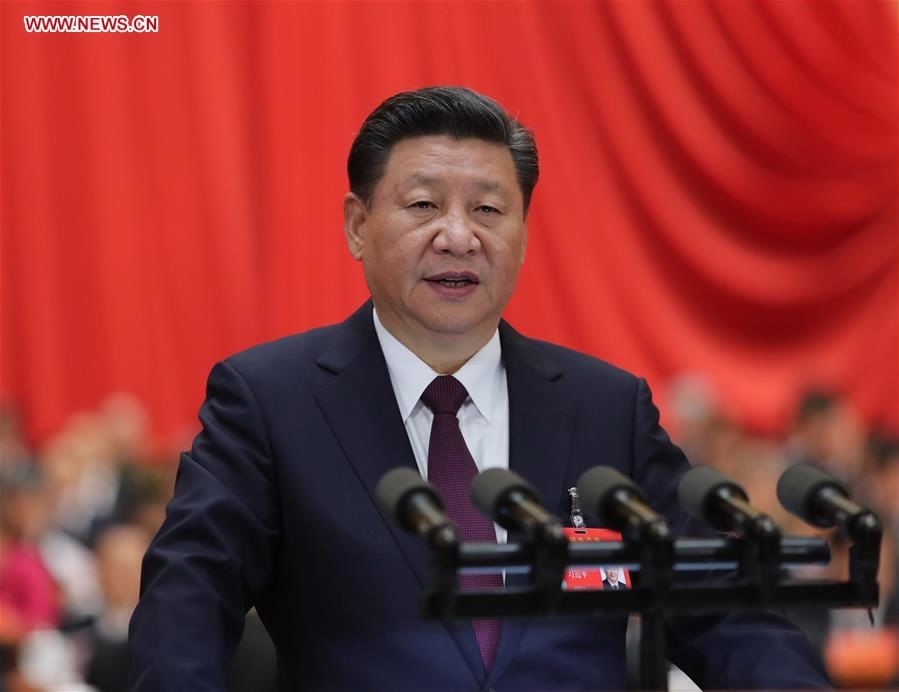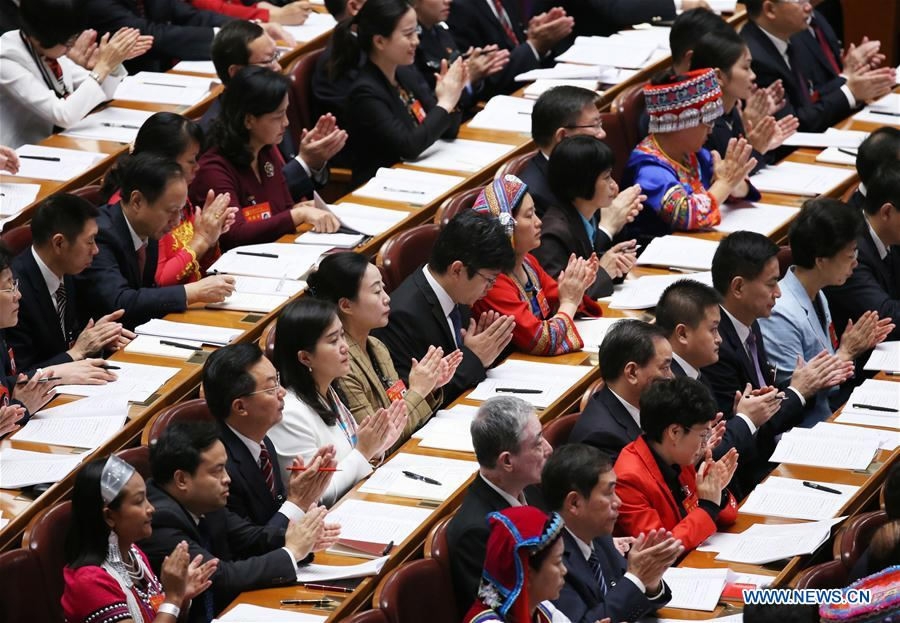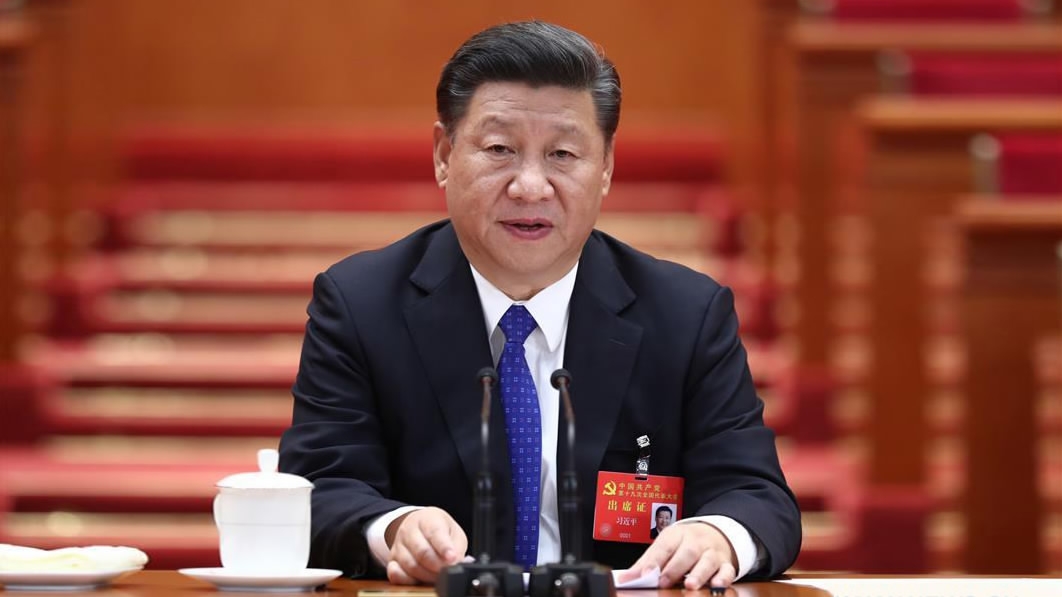A light rain touched the marble steps of the Great Hall of the People in Beijing as delegates arrived on the morning of October 18, 2017 to attend the opening session of the 19th National Congress of the Communist Party of China (CPC).
To the surprise of many, the Congress opened with a minute of silence during which all delegates stood with heads bowed, in memory of the first generation of leaders who established the Peoples Republic of China 68 years ago.
By adding this moment of silence at the opening of the Congress, China’s current leadership is honoring its historic past. At the same time, it is distinguishing clearly the present new era, from the preceding one.

Xi Jinping (C, front), Li Keqiang (3rd R, front), Zhang Dejiang (3rd L, front), Yu Zhengsheng (2nd R, front), Liu Yunshan (2nd L, front), Wang Qishan (1st R, front), Zhang Gaoli (1st L, front), Jiang Zemin (4th R, front) and Hu Jintao (4th L, front) attend the opening session of the 19th National Congress of the Communist Party of China at the Great Hall of the People in Beijing, capital of China, on October 18, 2017. /Xinhua Photo
Xi Jinping (C, front), Li Keqiang (3rd R, front), Zhang Dejiang (3rd L, front), Yu Zhengsheng (2nd R, front), Liu Yunshan (2nd L, front), Wang Qishan (1st R, front), Zhang Gaoli (1st L, front), Jiang Zemin (4th R, front) and Hu Jintao (4th L, front) attend the opening session of the 19th National Congress of the Communist Party of China at the Great Hall of the People in Beijing, capital of China, on October 18, 2017. /Xinhua Photo
General Secretary Xi Jinping is starting with a clean slate. Delivering his opening address, he lost no time in setting a new course, adopting in his statement the term "socialism with Chinese characteristics for a new era." The key words here are, "new era."
As head of the largest communist party in the world, Xi’s challenge is to re-engineer the CPC to make it an effective and innovative leadership. The question is how to take Marxism, a 19th Century economic theory that analyzed social relations during the industrial revolution, and make it relevant to China in the 21st Century.
China now leads the world in green finance, mobile banking, artificial intelligence research and development. Bridging the gap is huge. It is also generational.

Xi Jinping delivers a work report to the 19th National Congress of the Communist Party of China on behalf of the 18th Central Committee of the CPC at the Great Hall of the People in Beijing, capital of China, on October 18, 2017. The CPC opened the 19th National Congress Wednesday morning. /Xinhua Photo
Xi Jinping delivers a work report to the 19th National Congress of the Communist Party of China on behalf of the 18th Central Committee of the CPC at the Great Hall of the People in Beijing, capital of China, on October 18, 2017. The CPC opened the 19th National Congress Wednesday morning. /Xinhua Photo
No wonder that Xi spoke for three and a half hours in delivering a detailed blueprint – effectively a business plan – to re-engineer the mindset and functions of the CPC to lead China into a high tech and environmentally sensitive future. That is where the term "new era" comes in.
Xi openly confronted past problems of corruption and power abuse. He acknowledged that corruption had caused a credibility crisis for the CPC. He stated, "We must have the determination to get rid of all outdated thinking and ideas and all institutional ailments, and to break through the blockades of vested interests."
Thereby challenging conservative, entrenched ideas that are not consistent with the new era.
His speech added "innovate" topping the list of traditional CPC terms such as "unity," "solidarity," "vigilance" and "vitality" held as standards by which CPC members should lead. In the "new era" China is leading global technology, artificial intelligence, renewable energy and green finance. It just makes sense for innovation to set the standard for the CPC members.

Delegates attend the 19th National Congress of the Communist Party of China (CPC) at the Great Hall of the People in Beijing, capital of China, on October. 18, 2017. The CPC opened the 19th National Congress on Wednesday morning. /Xinhua Photo
Delegates attend the 19th National Congress of the Communist Party of China (CPC) at the Great Hall of the People in Beijing, capital of China, on October. 18, 2017. The CPC opened the 19th National Congress on Wednesday morning. /Xinhua Photo
Of course, of the CPC’s 89.44 million members, thirty-five percent are under age forty. That makes the CPC the youngest it has been since it was established 96 years ago.
While Xi opened the 19th CPC Congress by honoring revolutionary leaders who founded the People’s Republic of China sixty-eight years ago, it is noteworthy his speech ended by acknowledging the importance of China’s youth.
"A nation will prosper only when its young people thrive; a country will be full of hope and have a great tomorrow only when its younger generations have ideals, ability and strong sense of responsibility," he said.
By doing so Xi made several points. To assure China’s stable and prosperous future the CPC must give youth hope. Giving hope to youth is one point. Giving them ownership of their future is another. For the CPC to lead China effectively in the future, the youth must be the ones who own it.
(Laurence Brahm is a founding director of the Himalayan Consensus Institute and a Senior Fellow with the Center for China and Globalization. He has lived and worked in China for 25 years and is the author of over 20 books on the Asian region. His work covers a wide spectrum from economic development reform in China and Southeast Asia to Tibetan new age travel. He is the author of Zhu Rongji and the Transformation of Modern China and China as No. 1. His books on Tibet include Searching for Shangri-la: Off the Beaten Track in Western China and Conversations with Sacred Mountains: A Journey along Yunnan's Tea Caravan Trail. The article reflects the author's opinion, and not necessarily the views of CGTN.)





